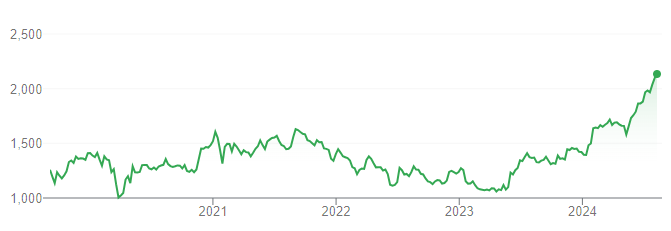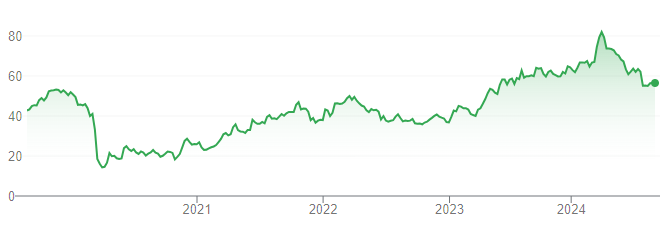Why strategic investors are shifting their focus to this area of the market
There has been vibrant debate on the Livewire platform recently about whether Australia or the US is the better place to invest – as if they were the only two options.
Of course, they are not, and investors would do well to remember that.
According to a report by Thornburg Investment Management published in January this year, over the last 25 years, emerging market (EM) equity returns have generally outpaced their developed market peers.
“Since the end of 1998, the S&P 500 has delivered a 7.55% annualised total return, just behind emerging markets at 7.83%," the report said.
"While the NASDAQ has delivered 10.06% annualized return over the entire period, almost half of the total return has come since the COVID pandemic hit. What may come as a surprise is that both the S&P 500 and NASDAQ had significantly lagged EM in cumulative (and annualised) performance before COVID despite the pedestrian returns delivered by Emerging Markets over the last decade”.
All that said, it must be recognised that emerging markets have struggled more recently, particularly last year in which EM delivered 10.12%, versus the S&P 500’s 26.26%.
Rasmus Nemmoe, Portfolio Manager at FSSA Investment Managers - Global Emerging Markets, believes context is important here, noting that the relative underperformance of EM “has been more about the relative rise of the US compared to everything else”, with America “sucking in lots of capital from around the world”.
Will the US hegemony last?
According to Nemmoe, a host of factors contributed to the recent outperformance of US markets.
The tax cuts that Trump initiated in 2017, coupled with the fiscal stimulus during and post-COVID, put US markets on an “accelerating trajectory”, says Nemmoe, who adds that while the US has some great businesses, leadership is very narrow.
With tax cuts potentially expiring next year and questions rightly being asked about the US’s ability to run very wide deficits, some of the tailwinds that have driven US outperformance could “neutralise and maybe even turn negative”, says Nemmoe.
While those factors could mean that the market performance differential will narrow, another important economic effect will likely occur — a weakening of the US dollar.
“That would be a new tailwind for emerging markets”, says Nemmoe.
While US markets have outperformed, strong arguments are being proffered that they are overvalued. That’s not the case with EM, according to Nemmoe.
“Outside of India, things are quite depressed. China is hitting new lows, ASEAN countries are hitting new lows, while LATAM and EMEA (Europe, Middle East, Africa) are also depressed”, says Nemmoe.
“Overall the market is certainly cheap. There is quite good value across the board, with the exception of India and AI-related themes”.
People power
Whatever the backdrop, when hunting for suitable investment opportunities Nemmoe and his team employ a long-term, bottom-up quality focus, with people at the core.
“For us, quality has always started with people. We spend a lot of time assessing the people behind the business. If you're going to be a long-term investor, it's quite important to get the people side of things right”, says Nemmoe.
That focus on people manifests in more than 1600 meetings per year that the team conducts. What are they looking for? Well, there are numerous factors:
- Alignment: does the management team have skin in the game? “An owner-operator is preferred”, says Nemmoe.
- Expertise: highly regarded, but so is the ability to bring in expertise when required and effectively oversee a business
- Track record: also very important but what’s critical is how management have acted over the cycle. “We tend to probably lean on the slightly more conservative side of management teams”, says Nemmoe.
- Innovation: while the lean is towards conservatism, this shouldn’t come at the expense of being innovative, according to Nemmoe. “That's a very fine balance - how management think about the future, how they want to position themselves, is absolutely critical. We’re looking for management teams where you have long-term incentives that align with yours”.
In Nemmoe’s experience, the management teams that have a longer-term perspective and are self-aware are some of the best he’s come across.
“You want to get a sense of how they think about the future. Are they able to read the landscape and not just what's happening within the next one or two years, but what's happening within the next three to five years around them?"
Stocks in the portfolio
Of the emerging market countries, Nemmoe highlights India as an area of focus, even though opportunities are starting to be priced appropriately.
“The formalisation of the Indian economy is going to be a long-term investment theme. Historically, it has been a market we have been very excited about and have been deploying a lot of capital", he says.
"India is in a very attractive position where you have a great concentration of quality companies, great management teams, and lots of secular opportunities".
ICICI General Insurance (NSE: ICICIGI)

One company that FSSA has invested in is ICICI General Insurance. It is plugged into the burgeoning Indian economy, and the increasing consumption of certain goods and services (i.e. insurance) as the population becomes wealthier.
“If you look at insurance penetration in India, it's very low. Per capita spending is around $5. In China, it's around $200 per capita. And in Australia and the US, it's $2000-3000", he says.
“Furthermore, only around 100 million Indians currently have insurance today, so there are secular tailwinds in play”.
Aside from those tailwinds, Nemmoe likes that the company has been around for 25 years, has a strong distribution advantage, and a track record of managing risk across many market cycles.
This last factor is critical, because many competitors have either gone out of business or are struggling to survive because of their mismanagement of the cycle.
“They're taking too much risk and pricing themselves too cheaply at a point in time they shouldn't have taken that risk” says Nemmoe, adding that doing so has “resulted in many competitors being insolvent, despite the fact that you have such favourable long-term tailwinds”.
Alsea (BMV: ALSEA)

Nemmoe also likes Alsea, which he describes as the “Mexican Starbucks operator”. It has been in the portfolio since its inception.
Alsea is a family-owned business which was set up in 1993. Two brothers started with a single dominos outlet, grew the number of stores, and “did so well that they were awarded the Domino's franchise in Mexico”, says Nemmoe.
“Then in the early 2000s, when Starbucks was set to expand outside of the US, they approached the family to help set up in Mexico”.
As well as being founder-led, the business is “very cash generative, with decent margins and strong growth opportunities ahead of it”, says Nemmoe, adding that whilst there are 15,000 Starbucks outlets for 320 million people in America, for the 120 million in Mexico there are less than 1,000 outlets.
Why EM, why now?
Bringing the conversation full circle, I asked Nemmoe why investors, given they have so much choice, should consider EM right now.
He believes that the headwinds for EM are abating and that a lot of the tailwinds for the rest of the world – particularly the US – are moderating and potentially neutralising.
“If you are a strategic asset allocator looking five years out, I would argue that now is the time to diversify", says Nemmoe.
According to World Economics, emerging markets accounted for 66.7% of global GDP growth in the past 10 years, whilst its share of market cap declined in that period, according to Nemmoe.
One of the critiques of emerging markets over time has been that they are riskier than developed markets. Nemmoe doesn’t argue this point, although he certainly believes that is no longer the case.
“Looking at emerging markets today compared to 10 years ago, you could argue back then clearly none of the risks were priced in", he says.
“I would argue today that a lot of the risks are priced in and the longer-term secular opportunities outweigh the risks.
"Emerging markets are going to have the highest population growth and account for most of the economic activity that you're going to see, and that will create compelling opportunities".
Tap into some of the world’s fastest-growing markets
Driven by fundamental company research, FSSA Investment Managers delve deep into global emerging markets to invest in high quality equities that can outperform over the long term. For further information, please visit their website or fund profile below.

2 topics
1 fund mentioned
1 contributor mentioned

